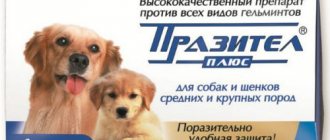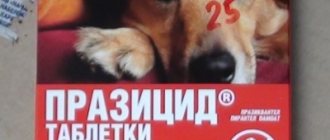Properties
Prazicide suspension 60, 40, 20 belongs to combined anthelmintic drugs.
The drug has a wide spectrum of anthelmintic effect on all phases of development of round and tape helminths parasitizing dogs and cats, including Tohocara canis, Toxocara mistax, Toxascaris leonina, Uncinaria stenocephala, Trichuris vulpis, Ancylostoma caninum, Echinococcus granulosus, Alveococus multilocularis, Mesocestoides lineatus, Dipylidium caninum, Diphyllobotrium latum, Multiceps multiceps. The mechanism of action of praziquantel and pyrantel, which are part of the drug, is based on inhibition of fumarate reductase, persistent depolarization of helminth muscle cells, disruption of energy metabolism, which causes paralysis and death of helminths and promotes their removal from the gastrointestinal tract.
When the drug is administered orally, praziquantel is rapidly absorbed from the gastrointestinal tract, reaching its maximum concentration in the blood plasma after 1-3 hours, and is distributed in the organs and tissues of the animal; excreted from the body mainly in urine (up to 80%) within 24 hours. Pyrantel pamoate is poorly absorbed, which ensures its prolonged effect on helminths in the intestines; excreted from the body mainly unchanged in feces (93%).
Prazicide suspension 60, 40, 20 in terms of the degree of impact on the body is classified as a low-hazard substance (hazard class 4 according to GOST 12.1.007-76), in recommended doses it does not have embryotoxic, teratogenic or sensitizing effects. Well tolerated by dogs and cats of different breeds and ages.
Description
Prazicide suspension Plus 9 ml with a syringe dispenser for oral use for puppies of medium and large breeds. As active ingredients, 1 ml contains: 45 mg of pyrantel pamoate, 45 mg of febantel, 15 mg of praziquantel and excipients: polyvinylpyrrolidone - 32 mg, glycerin - 50 mg, aspasvit Ts-200 - 5 mg, Tween-80 - 6 mg, xanthan gum – 2.5 mg, sodium benzoate – 1.5 mg, potassium sorbate – 1.5 mg, antifoam – 0.7 mg, citric acid – 0.5 mg, “Milk chocolate” flavor – 1 mg, Na- carboxymethylcellulose – 2.5 mg and purified water – up to 1 ml. In appearance, the drug is a light yellow suspension; during storage, separation of the suspension is allowed, which disappears when shaken.
Doses and method of administration
The drug is administered to animals orally individually, in the morning feeding with a small amount of food, or forcibly administered to the root of the tongue using a dosing syringe in the following doses: 1 ml per 3 kg of animal weight. For therapeutic purposes, as well as for the purpose of prevention in group (crowded) keeping of animals (kennels, shelters, vivariums), treatment is carried out twice with an interval of 14 days: for nematodes once a day, for cestodes and mixed nematode-cestodes infestations once a day. day for 3 consecutive days. A preliminary starvation diet and the use of laxatives before deworming are not required. The bottle of suspension should be shaken thoroughly before each use.
Pharmacological properties
Prazicide-suspension Plus refers to combined anthelmintic drugs. The combination of praziquantel, febantel and pyrantel pamoate, which are part of the drug, provides a wide spectrum of its anthelmintic effect on gastrointestinal nematodes (Toxocara canis, Toxocara cati, Toxocara mistax, Toxascaris leonina, Uncinaria stenocephala, Trichuris vulpis, Ancylostoma caninum) and cestodes (Echinococcus granulosus, Alveococus multilocularis, Mesocestoides lineatus, Dipylidium caninum, Diphyllobotrium latum, Multiceps multiceps), parasitic in dogs. Pyrantel pamoate is a compound of the pyrimidine group, its mechanism of action is based on blocking the transmission of nerve impulses at neuromuscular synapses by depolarizing the membranes of muscle cells, which causes paralysis of the muscular system of nematodes; pyrantel is poorly absorbed, which ensures its prolonged effect on helminths in the intestines; excreted from the body mainly unchanged (93%) in feces. Praziquantel is a compound of the pyrazinisoquinoline group, active against gastrointestinal cestodes at all phases of development. By increasing the permeability of the parasite's cell membranes to calcium ions (Ca2+), it causes membrane depolarization, muscle contraction and tegument destruction, which leads to the death of helminths and promotes their elimination from the animal's body. The compound is rapidly absorbed in the gastrointestinal tract, reaching a maximum concentration in the blood plasma after 1-3 hours, reversibly binds to serum proteins (70-80%), is partially metabolized in the liver, re-excreted into the intestine, and excreted from the body mainly in the urine. (up to 80%) within 24 hours. Febantel belongs to probenzimidazoles, which are biotransformed in the body into benzimidazoles. The mechanism of action of febantel is based on inhibition of the fumarate reductase enzyme in the mitochondria of helminths, as a result of which the absorption of glucose and the synthesis of the protein tubulin are disrupted, which leads to the destruction of the microtubular apparatus of the parasite cells, causing its death. Febantel is absorbed in the intestine, metabolized in the liver and excreted with bile into the intestinal lumen, where its repeated resorption is partially noted, and is excreted from the body both in unchanged form and in the form of several metabolites in feces and urine. Prazicide-suspension Plus, in terms of the degree of impact on the body, is classified as a low-hazard substance (hazard class 4 according to GOST 12.1.007-76), in recommended doses it does not have embryotoxic, teratogenic or sensitizing effects, and is well tolerated by dogs of different breeds and ages.
Instructions
PHARMACOLOGICAL PROPERTIES
Prazicide-suspension sweet is a combination drug,
having a wide spectrum of activity in relation to all stages of development
round and tape helminths, including Toxocara canis,
Toxascaris leonina, Uncinaria spp., Ancylostoma spp., Trichuris vulpis,
Echinococcus granulosus, Echinococcus multilocularis, Mesocestoides
lineatus, Diphyllobothrium latum, Dipylidium caninum, Multiceps
multiceps, Taenia spp., parasitic in puppies. Included in
praziquantel suspension, increases the permeability of cell membranes for
calcium ions and inhibits the parasite enzyme, fumarate reductase, causing
spastic contraction of muscles, turning into paralysis. Mechanism
Pyrantel pamoate acts by blocking neuromuscular
transmission, disruption of cell membrane permeability and inhibition
cholinesterase, which leads to paralysis and death of the helminth. When inserted
Praziquantel is rapidly absorbed orally from the gastrointestinal tract,
reaches maximum concentration in blood plasma after 1 – 3 hours,
distributed in the organs and tissues of the animal and excreted from the body in
form of metabolites in urine (up to 80%) within 24 hours. Pyrantel pamoate
poorly absorbed from the gastrointestinal tract, providing more
long-term parasitocidal effect directly in the intestine,
excreted from the body mainly unchanged in feces (93
%). The drug is easy to use, has a pleasant taste and is sufficiently
well eaten by puppies. According to the degree of impact on the body
warm-blooded animals Prazicide-suspension sweet belongs to moderate
hazardous substances and in recommended doses does not have any effect
locally irritating, sensitizing, teratogenic and
embryotoxic action.
INDICATIONS
Prescribed for preventive and therapeutic deworming
puppies of medium and large breeds against nematodes and cestodes, including
mixed invasions.
DOSES AND METHOD OF APPLICATION
Prazicide-sweet suspension is given to puppies orally once
individually in the morning feeding with a small amount of food or
injected directly onto the root of the tongue using a dispenser syringe made from
calculation of 1 ml of suspension per 3 kg of body weight. Before use, a bottle of
The suspension must be shaken thoroughly for 1 - 2 minutes.
Preliminary fasting diet and the use of laxatives for
use of the drug is not required. For preventive purposes
deworming is carried out once every 3 months, and also before each
vaccination. Therapeutic measures against nematodes and cestodes are carried out according to
indications. With a strong degree of invasion, the suspension is given again after
10 days.
SIDE EFFECTS
In rare cases, in those sensitive to the components of the drug
animals may experience allergic reactions. In these cases, the animals
carry out symptomatic therapy and prescribe antihistamines
in accordance with the instructions for use. With significant
an overdose of the drug in animals may cause depression
condition, refusal to feed, excessive salivation, disorders
functions of the gastrointestinal tract. In these cases, carry out
detoxification therapy.
CONTRAINDICATIONS
Increased individual sensitivity to components
drug. It is not recommended to deworm younger puppies.
3 weeks of age, as well as patients with infectious diseases,
recovering and exhausted animals. Do not prescribe a suspension
simultaneously with piperazine derivatives and other drugs
cholinesterase inhibitors.
SPECIAL INSTRUCTIONS
When using the drug in strict accordance with these instructions, no special instructions are required.
STORAGE CONDITIONS
In a dry place, protected from direct sunlight and out of reach of
children and animals place. Separated from food and feed in
manufacturer's packaging at temperatures from 0 to 25 ºС. Expiration date - 2
of the year.
Contraindications
A contraindication for use is individual intolerance to the components of the drug (including a history of). Prazicide suspension Plus should not be used in puppies under 3 weeks of age, malnourished animals, those suffering from infectious diseases, or convalescent animals.
Prazicide-suspension Plus should not be used simultaneously with medications containing piperazine and cholinesterase inhibitors. There is no data on the incompatibility of Prazcid-suspension Plus with drugs of other pharmacological groups and feed additives.
Prazicide suspension Plus is not intended for use in productive animals.
Content
1. Prazicide for dogs: pharmacological effects 2. Dosage and methods of administration 3. Contraindications and side effects 4. Cost 5. Reviews from veterinarians
The anthelmintic drug is approved by international associations of veterinarians. It belongs to the 3rd safety class and does not have a harmful effect on the body of a dog or cat. Available in the form of tablets or suspension. The tablets have marks for dividing into 4 parts, which is convenient for deworming small puppies and kittens. The porous structure of the medicine smoothes out the corners, so the tablet passes well through the larynx and does not leave any pain.
The syrup has a sweetish taste and can be mixed with water and given to drink from a bowl. If the dog refuses to take the medicine on its own, you must use a syringe without a needle and inject the solution onto the base of the tongue.
Side effects
When using Prazicide-suspension Plus in accordance with these instructions, side effects and complications in animals, as a rule, are not observed. Some animals may experience disturbances in the gastrointestinal tract (loose stools, vomiting) and increased salivation, which disappear spontaneously and do not require the use of medications. In case of increased individual sensitivity to the components of the drug and the appearance of allergic reactions, its use is stopped and the animal is prescribed antihistamines and symptomatic therapy.
Indications for use
Prazicide is effective against gastrointestinal parasites in cats and dogs from birth to adulthood. The product is used for therapeutic and prophylactic purposes. The drug expels adult parasitic individuals from the digestive system. The medicine is also effective against larvae. Prazicide is used to protect animals from worms when kept together.
Prazicide suspension is used for prophylactic and therapeutic purposes against nematodes, cystoses and cystic nematodes.
Yuri Lizvinsky Veterinarian, head of the training department of Apicenna LLC
Prazicide suspension is used for the following diseases:
- Nematodosis. A disease caused by parasitic roundworms. Among the most famous representatives of the class are roundworms, trichinella, toxocara, hookworms, and whipworms.
- Trematodosis. Damage to animals by trematodes, worms from the class of flukes. Most often they affect the liver, kidneys, and intestines.
- Cystosis. Infection of domestic animals with parasitic tapeworms. These are echinococci, tapeworms, tenioses, alveococci.
- Nematoso-cystosis. Helminthic infestations in cats and dogs of mixed type. They are found in all parts of the gastrointestinal tract.
special instructions
In case of an overdose of the drug, the animal may experience a depressed state, refusal to feed, excessive salivation, and gastrointestinal upset. In these cases, enterosorbents and symptomatic therapy are used.
Disturbances in the deworming regimen should be avoided as this may result in decreased effectiveness. If the next dose is missed, the drug must be administered as soon as possible in the same dose, then the interval between administrations of the drug does not change.










